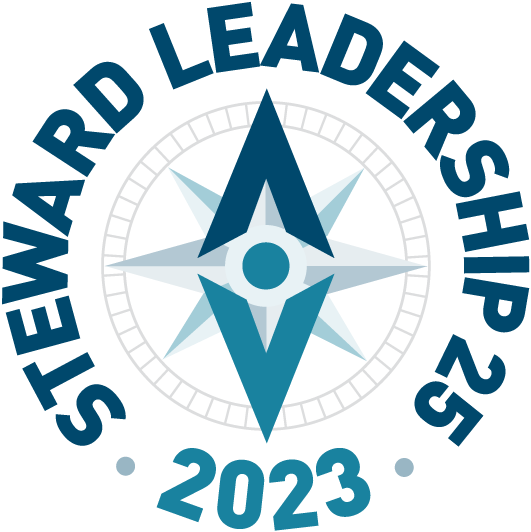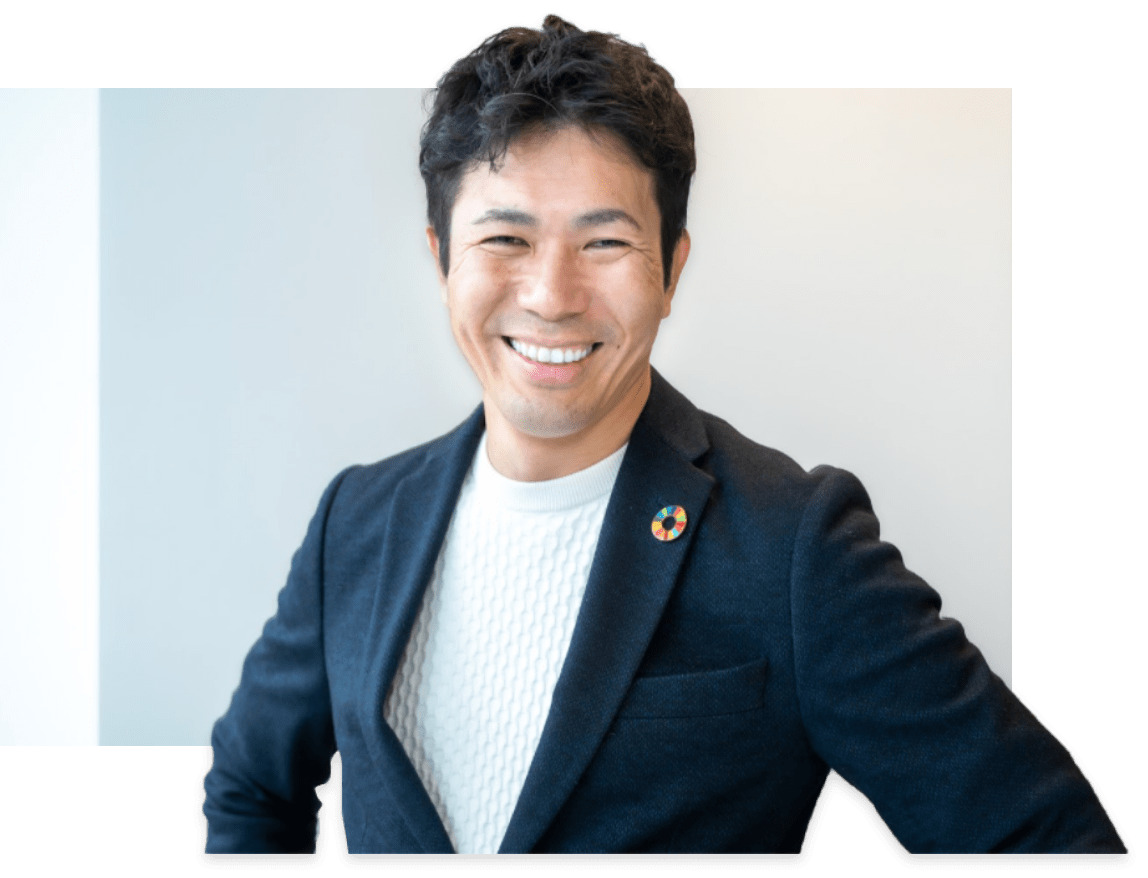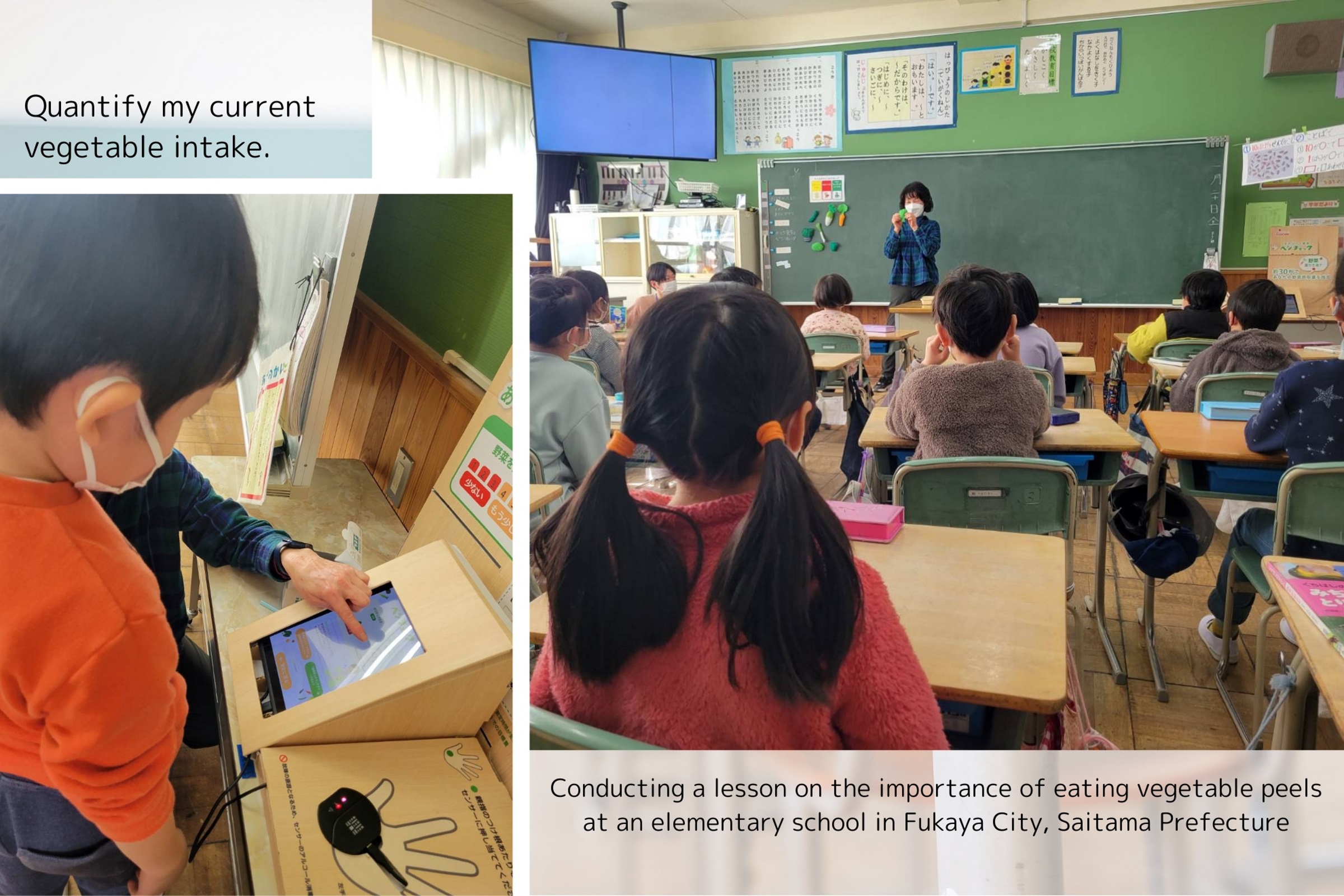Encouraging individuals to consume whole vegetables for a healthier people and planet.
Through our “Whole Nutrition Project," we educate people and raise awareness about the importance of eating vegetables with their skins on. Our goal is to help spread the message of eating vegetables with their skin on throughout Japan, and thereafter to the world, ultimately increasing people's sense of well-being.
Improving malnourishment and reducing food waste
By achieving this, we would solve two important issues around food and nutrition in Japan. Firstly, undernourishment is a significant issue amongst Japanese children. While there is little food shortage, about 80% of children suffer from a new type of nutritional deficiency. They are chronically deficient in vitamins, minerals, fibre and protein necessary for healthy growth, with an over-abundance of sugar, fat and carbohydrates.
Food loss and wastage are also a major source of concern in Japan, which produces approximately 5.27 million tonnes of food waste annually. More than half of this is generated by households. The main cause of such food waste is direct disposal (upon expiration of best-before dates), followed by leftovers (food left to rot and/or thrown away), and over-removal of edible parts of fruits and vegetables (peels, roots, leaves, etc.). Over-removal of vegetables and fruits consumes a lot of energy when disposed of via incineration, as they contain a lot of water. This disposal process then results in an increase in carbon dioxide emissions.
We have therefore focused on the importance of eating the peels, roots, seeds and pith of fruits and vegetables, which are usually discarded. Vegetable peels are richer in antioxidants and other immune-balancing nutrients than that of fruits. By fostering the habit of eating vegetable skins and peels, we make significant progress towards solving the issues of undernourishment of children and food wastage.
Transforming culture through education
To achieve the goal of people eating vegetables and fruits with their skins on, the "Whole Nutrition Project" has been working closely with schools. Since 2021, we have introduced school lunches with whole vegetable skins by providing nutritionists with information on washing and cooking methods, recipes that preserve nutritional value, and other necessary information to facilitate this process.
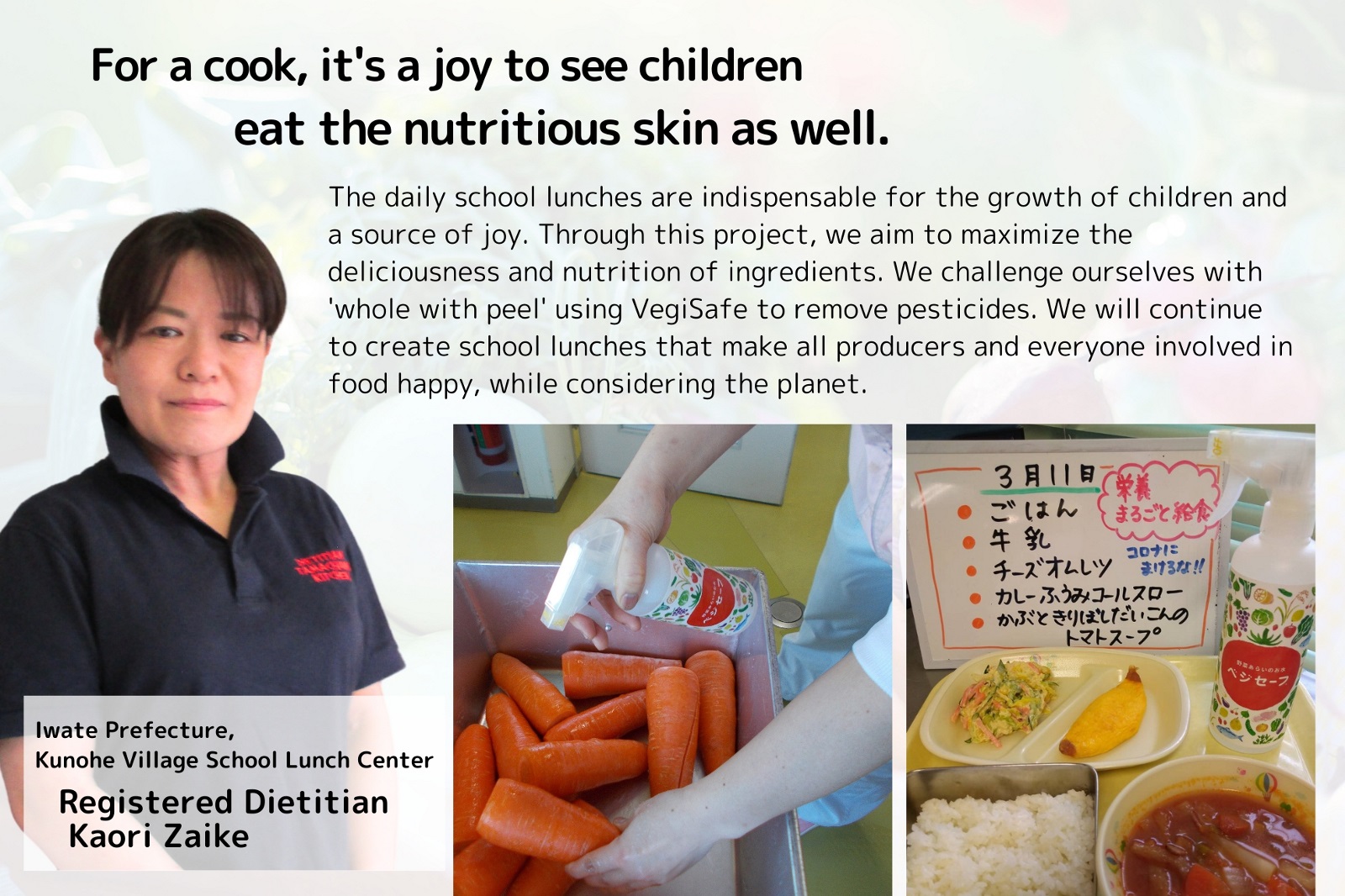
Preparing school lunches with whole fruits and vegetables
In March 2023, we further established a general incorporated association called the “Whole Nutrition Promotion Committee," where all its employees are Landlink employees. The committee has created a six-month educational programme using social media to provide various forms of content to raise greater awareness, convey information on how to wash, cut and prepare vegetables, and share recipes for tasty “whole-peel” cooking. Through this programme, we aim to establish a whole-peel culture among Japanese people, especially Japanese parents who cook for their families and children. The programme provides tailored opportunities for people of all ages, be they children or adults, to learn effectively. The incorporation of periodic quizzes ensures that proper information, depending on their knowledge and understanding, will be delivered to the participants.
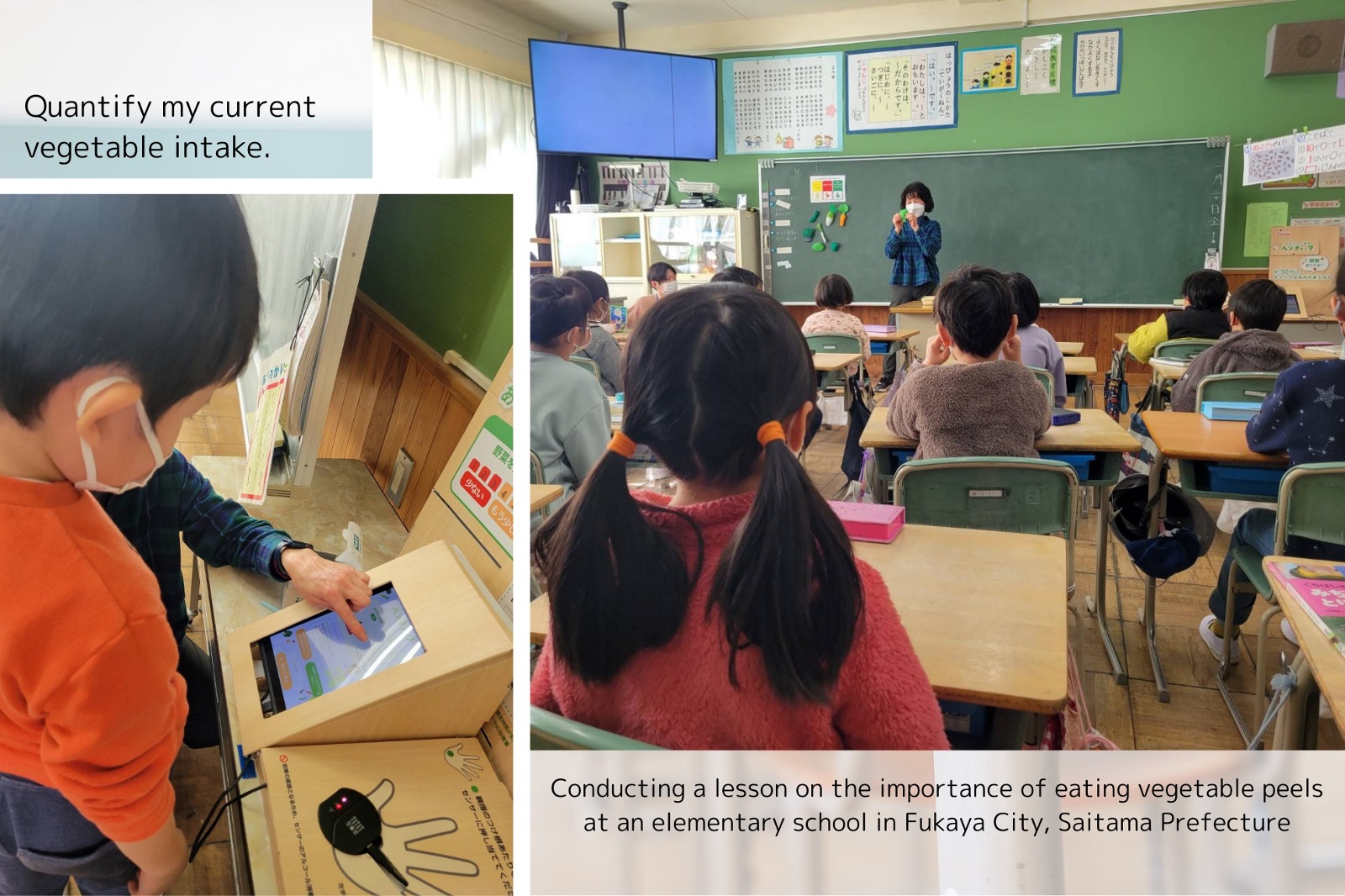
A lesson at an elementary school
Spearheading change in elementary schools
As a result of our efforts, 10,000 children are now eating “Whole Nutrition Project” school lunches, which are prepared with whole vegetable skins in such a way that nutrients are preserved. At the inception of the school lunch programme, I delivered a lecture to children at elementary schools to share the programme’s purpose and introduced a machine that measures vegetable intake. One month later, it was revealed that 83% of the children had increased their vegetable intake after starting the “Whole Nutrition Project” lunch programme. Furthermore, the amount of food wastage during the preparation of school lunches was reduced by approximately 10%.
An overview of our key outcomes are as follows:
Kume-mura School Lunch Centre (Iwate Prefecture)
- The amount of wasted vegetables decreased by about 10%, and the edible portion of food increased by about 10%. This was determined through data aggregated from a survey conducted by Kume-mura School Lunch Centre.
Fukaya Elementary School and Tokiwa Elementary School (Saitama Prefecture)
- Reported a decrease in the amount of waste vegetables, reduction in procurement costs, increase in edible portions of foods, and increase in carotenoids (antioxidants) intakes of children.
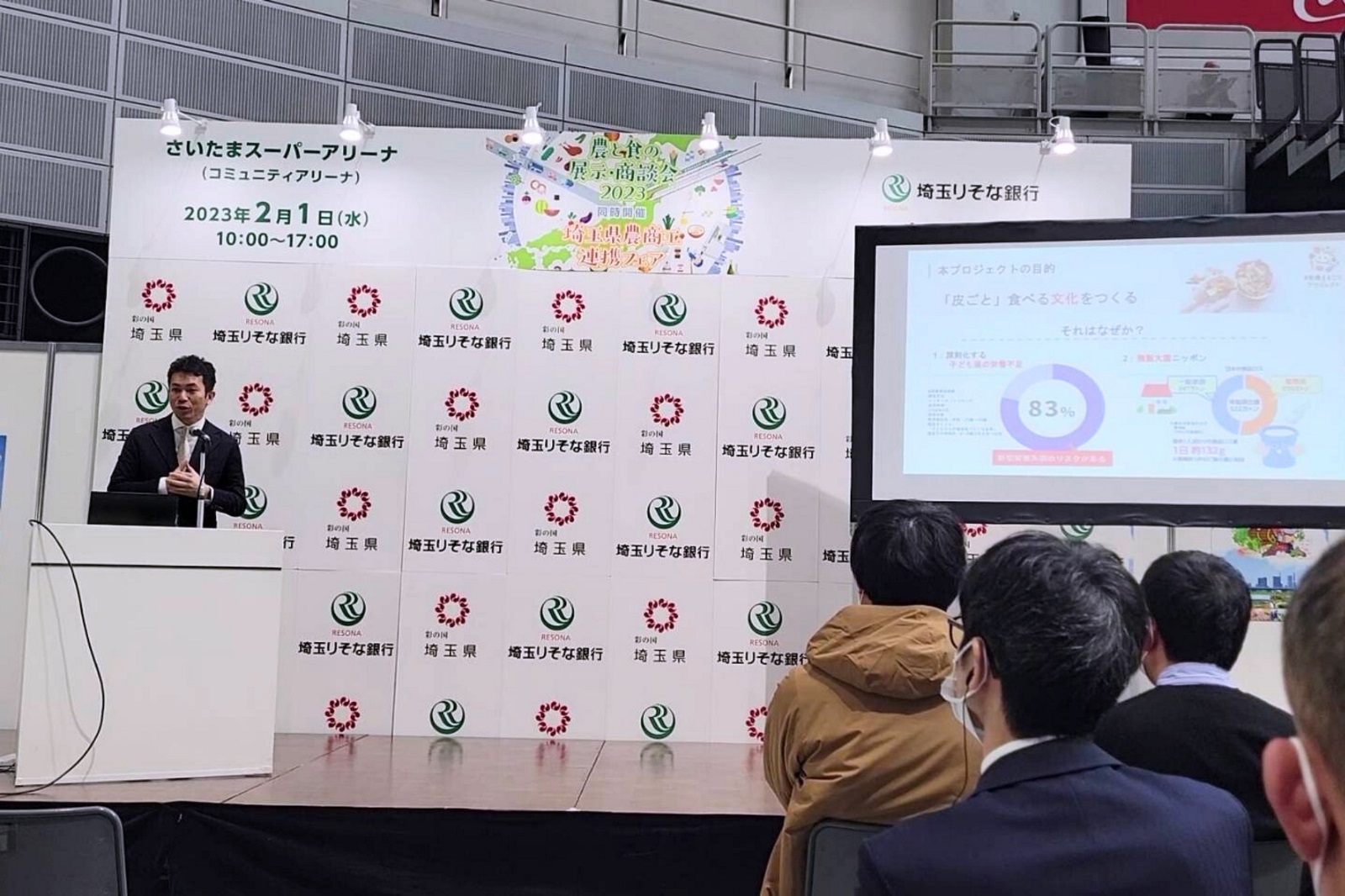
Sharing session at Saitama Prefecture
Improving community well-being through greater health awareness
Our mission is not only to address child malnutrition and food wastage but also to raise health awareness through education. We seek a future where communities experience a high level of happiness and heightened well-being by first enriching the food in their homes, raising health awareness, and finally enabling them to find greater clarity through their enhanced mind-body wellness.
To achieve this objective, we will expand the “Whole Nutrition Project” by expanding our educational efforts and developing accessible solutions for individuals to undertake with minimal spending. For instance, we are now planning an initiative with one municipality to develop a product utilising the whole skin of local specialty vegetables. This product is scheduled to be in stores in early 2024 and will be selected as a gift as part of their hometown tax donation programme. It will also be sold online and at local and nationwide supermarkets.
We are also planning to create supporter care system where supporters of our “Whole Nutrition Project” will receive products developed by participating municipalities as return gifts for their donation. Furthermore, we aim to have 10 million people registered in our education programme by 2030, such that it is widely used and established across Japan.
Through these multipronged efforts, we will build a future in which nutrition levels and food security are strengthened, food culture is enriched, and enhanced wellness is within reach for communities across Japan and the world.

With the vision of "Carving out the Future with the Power of Water," we are a company that pursues a wide range of "washing" activities, extending from the clothing cleaning industry to the development and sale of products for washing vegetables. Established in 2007, our business activities include: Clothing Cleaning Concierge "CHAMPION", Special Clothing Maintenance "MUSEO", Manufacture and sale of vegetable washing water “VegeSafe”
Learn more about landlink through their website. To collaborate or connect, reach out directly to our SL25 team.
Connect


